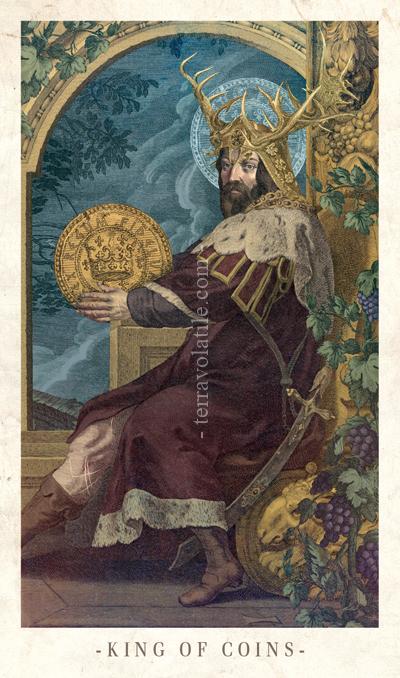Symbology, Meaning and Interpretation

Upright
Wealth, Enterprising, Resourceful
The King of Coins is generally defined as a successful businessman or professional.
His red robe defines his high social position but he, too, struggled to reach the position where he is now, as you can see by the scars in his legs.
The architecture that surrounds him is richly decorated by golden plants and fruits, symbols of wealth, prosperity, and success.
The large window by his side has a great panoramic view of the forest. Despite his Fire attributes, he is still very connected to the Earth, which means that he is able to relax and enjoy the pleasures of his wealthy life.
That connection with the Earth and Nature itself is emphasised by his golden crown with antlers.
The wild god Cernunnos is often portrayed with the same kind of antler headdress or grows them from his own forehead. This god of Nature and fertility is described as the guardian of the woods, merging characteristics from humans and animals/plants.
The antlers reflect the masculine power, since in most of the species only males bear them. In Nature they have great significance in sexual selection, both in female attraction and male competition. Both factors are highly related to the fertility and survivalism of the species. For some cultures, they reflect spiritual authority.
The same way, this King of Coins is a great leader who provides everything his court may need. His generosity is portrayed by the coin he seems to share.
This King might not be as dedicated or interested in arts as the Queen and the Page. Instead, he is very good with numbers, managing his gains, being practical and transforming ideas into successful enterprises.
His posture denotes a sense of confidence and self-control as well as a disciplined way of working. Being the King of the earthly suit, he knows that all the processes in Nature take time and patience, so that is an important lesson that he taught us.
The grapes by his side are a good example of that slow transformation of the fruit, requiring time and dedication to achieve the sweetest results. As a major symbol of the god Dionysus, the grapes represent abundance and the enjoyment of the pleasures of life.
From a different view, and because of his conservative methodology, the King can be stubborn, not seeing other views. He does not take any unnecessary risks, so he may not invest or believe in the most innovative and original projects. That can be a negative aspect of the King; to be, sometimes, too attached to his traditional patterns and formulas.
Reversed
Over-Materialistic, Doubtful Enterprises, Unsupportive.
The reversed position of the King of Coins reveals an impatient sovereign who is too attached to his materialistic gains. His greedy attitude makes him ignore the true value of things, focusing essentially on their price. By overlooking his generosity, he turned into a selfish, obsessive gambler, taking too many risks in his doubtful enterprises.
For him, money is before anything else.
His business methodology is aimed at fast and immediate gains, leading him to an eventual and imminent fall. A major material loss may happen if you keep using that same formula.
So this card alerts you to review your long term goals and learn to manage your finances, finding a better balance between your earnings and your expenses.
You need to find a middle point between saving money obsessively and overspending. Remember the importance of having savings, and also that you need to enjoy the fruits of your hard work.
The negative attributes of the upright King are also expressed in reverse, having a stronger intensity. His stubbornness and conservative view block the way to new creative and innovative ideas that can turn into successful projects. If they do not fit his own patterns, he totally despises them.
As a person, we see this King as a person with a huge fixation on materialism, someone from whom we couldn’t expect care or support. Make sure that that person is not you; if so, consider starting a different approach. Support the ones you care about, so they can support you back when you need.
